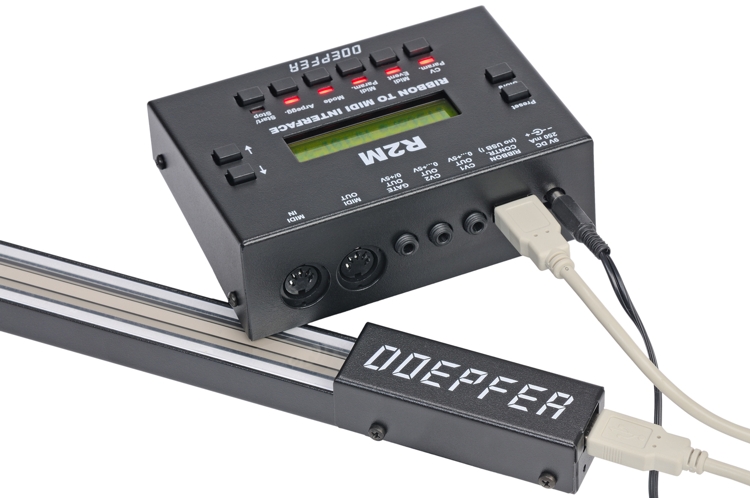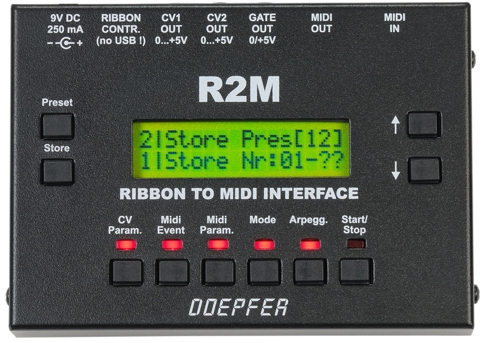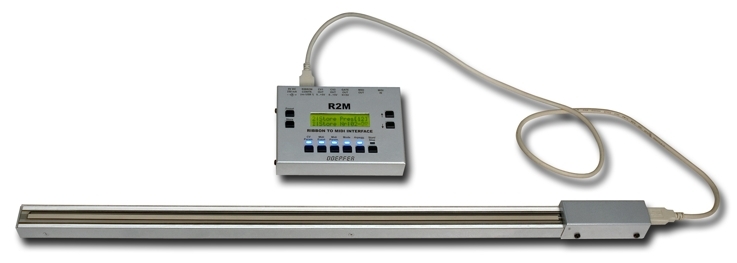R2M
Midi Ribbon
Controller
nicht mehr lieferbar / no
longer available |
|
R2M on Youtube:
R2M
in combination with Digitar: http://youtu.be/gSP1lFBID-w
violin
solo with R2M: http://www.youtube.com/watch?v=KXeTPPRXxMY&feature=youtube_gdata_player
STEPHAN
BODZIN Live @ Footwork: http://www.youtube.com/watch?v=3YSbcHigW9I
Trombone
Solo with R2M: http://www.youtube.com/watch?v=lpU_OcpYAZM
"Sleepwalk"
guitar solo on keyboard with R2M: http://www.youtube.com/watch?v=Ak2eL_0rCBE
Doepfer
A-100 + R2M Jam: http://www.youtube.com/watch?v=_wqu5qCmdIY
Weitere Youtube-Videos mit R2M /
More Youtube videos with R2M
|
|

Die
Gehäuse wurden 2011 von
silbergrau mit schwarzer Schrift
auf schwarz mit weißer Schrift
umgestellt.
The case coclors have been in 2011 changed from silvergrey
with black printing to black with white
printing.
|
R2M ist ein Ribbon-Controller,
der durch Bewegen eines Fingers auf dem Spielmanual entsprechende
Steuersignale erzeugt. Die Daten werden gleichzeitig als Midi-Signale
und als CV/Gate-Steuerspannungen ausgegeben. Der R2M ist somit in
der Lage sowohl Midi-Equipment wie auch CV/Gate-basierte Geräte (z.B.
Analog-Synthesizer oder analoge Modulsysteme) anzusteuern. R2M steht für Ribbon
to (2) MIDI.
R2M besteht aus zwei Teilen: dem Spielmanual und der Steuereinheit.
Bei dem Spielmanual kommt der gleiche Typ wie bei der Modulversion A-198
zum Einsatz. Dieses besteht im wesentlichen aus einem 50 cm langen
Positionssensor und einem darunter befindlichen Drucksensor. Die
Steuereinheit setzt die vom Manual gelieferten Daten (Position des Fingers
und Druck) in entsprechende Midi-Befehle bzw. CV/Gate-Spannungen um. Die
Steuereinheit ist auch einzeln erhältlich, um bereits vorhandene
A-198-Manuale anzuschließen und mit den erheblich umfangreicheren
Möglichkeiten des R2M auszustatten.
Hier die wichtigsten Eigenschaften des R2M:
|
R2M is a ribbon controller
that generates control signals by moving the finger on the ribbon manual.
The output signals are generated as Midi and CV/Gate control
voltages simultaneously. Consequently R2M allows to control both Midi and
CV/Gate based equipment (e.g. analog synthesizers or analog modular systems).
R2M is the abbreviation for Ribbon to (2) MIDI.
R2M is made of two parts: the manual and the control
box. For the manual the same type as the for the modular version A-198
is used. It includes a 50 cm position sensor and a pressure sensor. The
control box converts the data coming from the manual (finger position and
pressure) into the corresponding Midi data resp. CV/Gate voltages. The
control box is available even without manual to make use of an already
existing A-198 manual and take advantage of the additional features of the
R2M control unit compared to the comparatively simple A-198.
These are the most important R2M features:
|
|
1. Manual
|
1. Manual
|
 |
- Sehr präziser und empfindlicher Positionssensor
(Länge 50 cm), der bereits durch leichtes Auflegen des Fingers
aktiviert wird
- empfindlicher Drucksensor unter dem
Positionssensor
- Stabiler Metallrahmen (verschachteltes
Doppel-U-Profil), silbergrau lackiert
Hinweis: 2011 wurden die
Gehäuse von silbergrau mit schwarzer Schrift
auf schwarz mit weißer Schrift umgestellt
- Mehrere M3 Innengewinde an allen Seiten
(z.B. zur Fixierung an einer Unterlage, kombinierte Montage mehrerer
Manuale, Anbringung eines Tragegurtes etc.)
- Abmessungen: ca. 600 L x 30 B x 18 H
(Maße in mm)
- Gewicht: ca. 900 g
- Verbindung zur Steuereinheit über
4-poliges Kabel (baugleich zu USB, jedoch keine USB-Funktion !)
- Verbindungskabel 1m wird mitgeliefert
(längeres Kabel gegen Aufpreis, es kann ein reguläres USB-Kabel A-A
verwendet werden)
|
- very precise and sensitive position
sensor
(length 50 cm) that responds even to light finger touch
- sensible pressure sensor located
below the position sensor
- solid metal frame (double U-shape
profile), silver-grey color
remark: from June 2011 the cases are black with white printing
instead of silvergrey
with black printing
- several M3 threads on all sides (e.g. to
mount the manual on a base or to mount several manuals together or to
fix a strap or ...)
- measures: about 600 length x 30 width x 18
height (measures in mm)
- weight: about 900 g
- connection to the control box via 4-pin
cable (same as used for USB connections but no USB function )
- cable included, length 1m (longer cables
are available at extra charge, a standard USB cable type A-A can be
used)
|
|
2. Steuereinheit
|
2. Control Box
|
 |
- Empfängt die vom Manual gelieferten
analogen Widerstandswerte von Positions- und Druck-Sensor und setzt diese in
Midi- und CV/Gate Informationen um
- Bedienung über 10 Tasten, 6 LEDs
und beleuchtetem 2-zeiligen LC-Display
- Folgende MIDI-Befehle können den beiden
Sensoren zugewiesen werden:
- Note on/off ohne Pitch Bend
- Note on/off mit Pitch Bend
- Pitch Bend
- After Touch
- beliebiger MIDI-Controller
- Program Change
- "Trautonium-Modus": Dies ist
ein spezieller Modus, bei dem nur ein Note-On-Befehl beim Auflegen des
Fingers erzeugt und danach nur noch Pitch-Bend-Befehle, solange bis
der Finger abgehoben wird. Dieser Modus verlangt jedoch, dass am
MIDI-Empfangsgerät (Expander, Software - Synthesizer/ Emulation) eine
entsprechend große Pitch-Bend-Weite eingestellt werden kann und die
Pitch-Bend-Daten fein genug aufgelöst werden, so dass keine Stufung
zu hören ist ! Falls z.B. die maximal einstellbare Pitch-Bend-Weite 1
Oktave ist, so funktioniert das "Trautonium" auch nur über
1 Oktave (näheres zum Trautonium finden Sie in dem Trautonium-Dokument
auf unserer Web Site).
- Einstellbare Pitch-Bend-Weite, um R2M an
die Pitch-Bend-Weite des Empfängers anpassen zu können (Pitch-Bend
ist kein absoluter MIDI-Befehl, der Datenbereich kann beim Empfänger
z.B. +/- einem Halbton, +/- einer Quint, +/- einer Oktave usw.
entsprechen)
- 12 Bit Pitch-Bend Auflösung
- MIDI-Kanal, MIDI-Controller-Nummer
und Pitch-Scale sind einstellbar
- Quantisierungs-Option, d.h. nur
bestimmte Noten bzw. Steuerspannungen (z.B. nur aus Dur- oder Moll-Akkorden) werden erzeugt,
näheres zur Quantisierungsfunktion finden Sie bei der Beschreibung
des A-100-Moduls A-156, da die Quantisierung im
R2M sehr ähnlich zum A-156 arbeitet
- Einstellbare Skalierung des Manuals
(d.h. welcher Länge am Manual entspricht eine Oktave, maximal umfasst
das Manual 5 Oktaven)
- Inverse Skalierung möglich (wichtig
z.B. wenn das Manual mit Hilfe eines Tragegurtes umgehängt wird)
- MIDI-Ausgang
- Auflösung der vom Manual kommenden
analogen Werte mit 12 Bit AD-Wandlern
- Simultane Ausgabe als MIDI-Daten und
über CV/Gate
- 2 CV-Ausgänge in Form von zwei 3,5 mm
Mono-Klinkenbuchsen (wie beim A-100-System verwendet):
- CV1 gibt die Daten des
Positionssensors aus (1V/Oktave-Norm, 0 bis maximal +5V, d.h.
maximal 5 Oktaven)
- CV2 gibt die Daten des Drucksensors
aus (0...+5V)
- Gate-Ausgang in Form einer 3,5 mm
Mono-Klinkenbuchse (wie beim A-100-System verwendet), korrespondiert mit
CV1
- Gate-Ausgang wahlweise Spannungs-Gate
(0/+5V) oder S-Trigger (per Jumper im Gerät umstellbar)
- Polarität der Gate-Funktion
einstellbar:
- normal: 0 -> +5V beim Berühren
des Sensors
- invertiert: +5V -> 0V beim
Berühren des Sensors
- Auflösung der CV-Ausgänge: 12 Bit
- Alle eingestellten Funktionen (z.B.
Skalierung, Quantisierung) wirken sich auch auf die
CV/Gate-Ausgänge aus
- CV Haltefunktion und
Gate-Aktivierung gleichzeitig möglich (war beim
A-198 nicht
verfügbar)
- keine Drift der CV im Haltemodus (beim
A-198 driftet die Spannung im Haltemodus allmählich ab)
- 16 benutzerdefinierte Presets (d.h. 16
komplette Geräteeinstellungen speicherbar)
- Stabiles, schwarz
lackiertes
Metallgehäuse in Pulform
Hinweis: 2011 wurden die
Gehäuse von silbergrau mit schwarzer Schrift
auf schwarz mit weißer Schrift umgestellt
- Maße ca. 128B x 91T x 26H (vorne) bzw.
42H (hinten, wegen Pultform, Maße in mm)
- Gewicht ca. 450 g
- Verbindungkabel zwischen Manual und
Steuereinheit wird mitgeliefert (1m lang, längere Kabel gegen Aufpreis, es kann ein reguläres USB-Kabel A-A
verwendet werden)
- Midi-Kabel sind im Lieferumfang nicht
enthalten
- Stromversorgung über externes
Steckernetzteil 230V mit Eurostecker, bei Lieferungen innerhalb
Deutschlands ist dieses im Lieferumfang enthalten,
Netzteile für andere Netzstecker oder Netzspannungen müssen vom
Benutzer im jeweiligen Land erworben werden, bitte fragen Sie ggf. bei
der betreffenden Auslandsvertretung nach, ob
das Netzteil mitgeliefert wird (7...12V / min. 250mA DC erforderlich)
Da der verwendete Prozessor nicht mehr hergestellt wird, müssen wir die Produktion des
Gerätes leider
einstellen.
|
- receives the analog resistance data
coming from the position and pressure sensor of the manual and
converts these information into Midi date resp. CV/Gate voltages
- operation via 10 buttons, 6 LEDs and
illuminated 2 line LCD
- these MIDI messages can be assigned to
the two sensors:
- note on/off without pitch bend
- note on/off with pitch bend
- pitch bend
- after touch
- any MIDI controller (any control
change number)
- program change
- "Trautonium" mode: in this
special mode only a single note on message is generated when the
position sensor is touched. After that only pitch bend messages are
generated until the finger is lifted off. Attention! This mode
requires that the MIDI receiver (e.g expander or software synthesizer/
emulation) offers a sufficient pitch bend range (e.g. 5 octaves if a 5
octave "Trautonium" has to be emulated) and sufficient pitch
bend resolution so that no steps can be heard. If for e.g. the maximum
pitch bend width of the receiver is one octave only even the
trautonium mode will work only over one octave ! For details about the
Trautonium please refer to the Trautonium
document on our web site.
- Adjustable pitch bend width to adjust
the R2M pitch bend to the receiver's pitch bend (pitch bend is not an
absolute MIDI message, the full pitch bend data range may correspond
in the receiver e.g. to +/- one semitone, +/- one quint, +/- one
octave and so on)
- 12 bit pitch bend resolution
- MIDI channel, control change number and
pitch scale can be adjusted
- quantization option, i.e. only certain
notes resp. control voltages (e.g. only major or minor notes) are
generated, for details please refer to the A-100 quantizer module A-156
as the quantization of the R2M is very similar.
- adjustable manual scaling (i.e. which
length of the manual corresponds to one octave, full length is max. 5
octaves)
- inverse scaling is possible (important
if e.g. the manual is put on with a strap)
- MIDI output
- resolution of the analog manual data: 12
Bit
- simultaneous output of MIDI data and CV/Gate
voltages
- 2 CV outputs (3.5 mm mono jack sockets,
same as used in the A-100 system):
- CV1 outputs the position sensor data
(1V/octave standard, 0...max. +5V, i.e. max. 5 octaves)
-
CV2 outputs the pressure sensor data (0...+5V)
- Gate output (corresponds to CV1, 3.5 mm
mono jack socket, same as used in the A-100 system):
- Gate can be configured as voltage gate
(0/+5V) or switched trigger (jumper inside the box)
- adjustable gate polarity:
- normal: 0 -> +5V when the sensor
is touched
- inverse: +5V -> 0V when the
sensor is touched
- CV output resolution: 12 Bit
- all settings (e.g. scaling or
quantization) affect both MIDI and CV/Gate outputs
- CV hold and active Gate are possible at
the same time (was not possible for the
A-198)
- no CV drift in hold mode (A-198 has a
small CV drift in hold mode)
- 16 user defined presets (i.e. non
volatile memory for 16 complete settings of the unit)
- solid, black metal case (desktop
shape)
remark: from June 2011 the cases are black with white printing
instead of silvergrey
with black printing
- measures: about 128 width x 91 depth x
26 height (front) resp. 42 height (rear, because of desktop shape,
measures in mm)
- weight: about 450g
- connection cable between manual and
control unit is included (length 1m, longer cables
are available at extra charge, a standard USB cable type A-A can be
used)
- midi cables are not included
- external AC adapter for power supply,
AC adapter for 230V AC and European type of mains connector is included
within Europe, adapters for
other voltages or other mains connector types has to be purchased by the customer in his
country, 7...12V / min. 250mA DC required, please ask the representative in
your country if a power supply is included
As the processor used in the
R2M is no longer available we have to stop the production of this device.
|
Preise:
R2M mit Manual und Netzteil (230V-Version mit
Eurostecker): Euro 320,00
R2M Control-Box ohne Manual, mit Netzteil (230V-Version mit
Eurostecker): Euro 160,00
R2M Manual alleine (kombinierbar mit der R2M Control-Box oder dem Modul A-198):
Euro 160,00
USB-Kabel A-A, Länge 3 m: Euro 10.00
längere USB-Kabel auf Anfrage oder im EDV-Fachhandel
|
Prices:
R2M with manual and power supply (230V, European mains
connector): Euro 320.00
R2M control box only without manual,
with power supply (230V, European mains
connector): Euro 160.00
R2M manual only (for combination with the R2M control box or module A-198):
Euro 160.00
USB cable A-A, length 3 m: Euro 10.00
longer USB cables upon request or in your local computer store
|
|
Die deutsche Bedienungsanleitung ist als
pdf-Datei auf unserer Web Site verfügbar: R2M_Anleitung.pdf
|
The user's guide is available as pdf file on
our web site: R2M_man.pdf
|
|
Ähnliche Produkte:
Trautonium Manual / Ribbon
Controller A-198
Näheres zum Trautonium: Das
Trautonium-Projekt
|
Related products:
Trautonium Manual / Ribbon
Controller A-198
Details about the Trautonium: The Trautonium
project
|
|
|

Das Foto zeigt die
alte Version mit
silbergrauem
Gehäuse / the picture
shoes the former version with
silver-grey
case color
|
|
|
Klangbeispiel, erstellt von Jan-Hinnerk
Helms / sound example made by Jan-Hinnerk Helms: Ribosome.mp3
Youtube-Videos mit R2M /
Youtube videos with R2M:
http://www.youtube.com/watch?v=KXeTPPRXxMY&feature=youtube_gdata_player
http://www.youtube.com/watch?v=3YSbcHigW9I
http://fr.youtube.com/watch?v=wZblzFM_WWg
http://www.youtube.com/watch?v=lpU_OcpYAZM
http://www.youtube.com/watch?v=Ak2eL_0rCBE
http://www.youtube.com/watch?v=ZX1fHKsjwaA
http://www.youtube.com/watch?v=9AySMhAXMrc
http://www.youtube.com/watch?v=sghxmc_oifg
http://www.youtube.com/watch?v=o8dIJmpt8IY
http://www.youtube.com/watch?v=qjEdSqaq0GM
http://www.youtube.com/watch?v=_wqu5qCmdIY
http://www.youtube.com/watch?v=XUMnH7dzzdU
http://www.youtube.com/watch?v=ddaYqsiYtNE
http://www.youtube.com/watch?v=RWtg9MV_8BI
http://www.youtube.com/watch?v=w7kVuL7UnhI
http://www.youtube.com/watch?v=MPSYQdXWzKU
http://www.youtube.com/watch?v=9Pmp3sR91ak
http://www.youtube.com/watch?v=YNgn9pS-pYI
http://www.youtube.com/watch?v=pMomih95EMw
http://www.youtube.com/watch?v=0-xTIceWQOg
http://www.youtube.com/watch?v=VzPZR-CmQf4
http://www.youtube.com/watch?v=df5CsGsxg7A&p=47841F6FA9C4381A&playnext=1&index=3
|
|
|
Auf unseren FAQ-Seiten
finden Sie Antworten zu folgenden Fragen:
- Wie kann ich die alte und neue Version
des Manuals unterscheiden ?
- Kann das alte Manual auf die neue
Version aufgerüsted werden ?
|
On our FAQ
pages you find answers to these questions:
- How can I distinguish between the old
and new version of the manual ?
- Is it possible to update the old manual
to the new version ?
|



